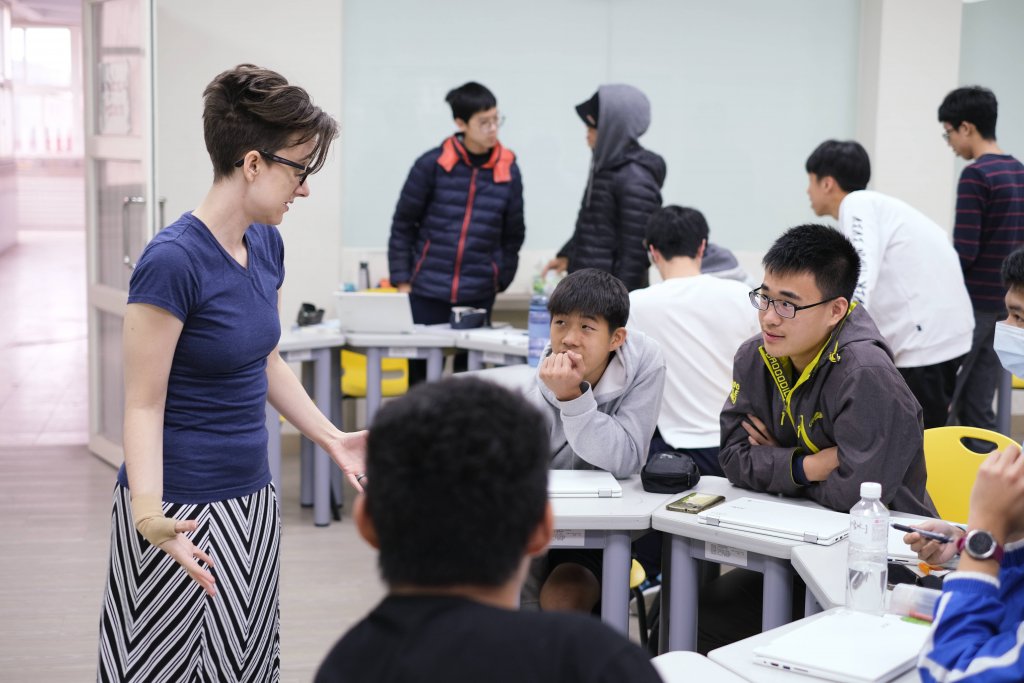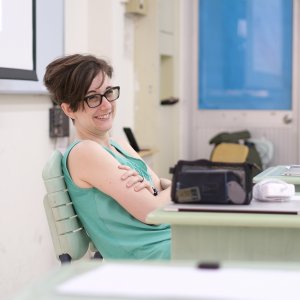Debate provides a unique educational opportunity that emboldens students to speak up for themselves and others. In 2018, the Executive Yuan set the goal for the island to be bilingual by 2030. The desire to create a populace that can fluently communicate in English and Mandarin is quite ambitious. To aid the island reach this goal, a Fulbright grant was created to bring debate coaches from the United States to Taiwan to train high school teachers and students how to compete in US style debate. This grant is the first of its kind and I am very honored to be involved.
As a debate coach and lecturer, I have introduced thousands of students and many adults to the benefits of debate. I believe that the skills it teaches are useful for all individuals at all stages of life. I was extremely excited when I learned that I would be working with students and teachers all over the island of Taiwan and not
just one class. In a semester at my university I work with 26 students at a time, so getting to work with almost 100 students I knew that I was going to be in for a unique challenge. I prepared by talking with teachers at the high school level to get tips and tricks of working specifically with high school students. I also began to do some research regarding ways to teach English as a Foreign Language students more effectively. While I did not know exactly what level the students would be at when I met them, I believe that this time I spent speaking with various teachers and the research I read aided my ability to quickly adapt in the classroom setting.
Despite the Covid-19 delay, the online winter workshops were well attended, and I believe they introduced a lot of individuals to US Public Forum (PF) debate. However, the workshops did not really make the spring semester any easier in the classroom come spring. Many of the classes I taught did not do much, if any, preparation work with their students in the fall semester. A month before classes began I learned that the majority of classes had teachers that had no debate experience and had not worked with the students in the fall at all. It made the prep work a little different from what I had planned prior to emailing with the teachers. Thankfully, all of the teachers were very helpful in answering my questions about what their goals were for the students and what typical expectations were for their students. It would have been nice if all of the students we were working with had watched the lectures from the winter internet workshops so that more time in class could have been dedicated to actual debate.
I think that we were too ambitious with what we wanted the students to achieve in a single semester. Attempting to teach EFL students what debate is, learn to do debate research, and write arguments for debate should not have been attempted and overwhelmed a lot of students with lower English skills. Due to the reduction in the classroom time, we should have just focused on the skills needed for basic debate and encouraged the students that were interested in competing in debate to learn from the incoming debate coaches. If we had been able to spend the first half of the school year introducing what debate is and then spent the second half of the school year practice debating, we would have been more successful. Despite the shortened time with the students, many in my classes were able to participate in at least one debate.
One of the students from Kaohsiung was very nervous for her class debate and reached out to me via Line for help the weeks leading up to her debate. I was so proud of her for reaching out to me because she was one of my students that was quiet and terrified of the class at the beginning of the semester. She was convinced that she did not know what she was doing and tried to quit many times, but all she needed was someone to tell her that she could do it and give her small reminders of what to do. We were able to talk through Line so that she could write her speeches and feel prepared. When she debated, she impressed not only me, but the other teachers of the class as well. The student who cried after the first day of class and wanted to quit gave one of the better speeches in the class. I was so proud of her and in her reflection portfolio she mentioned that even though this was one of the hardest classes she had taken she felt proud that she made it to the end.
Another part of the grant was to host workshops every month that covered a variety of topics regarding debate for teachers and students. The first workshop had a few students attend, but after that the students did not seem interested in attending. We also never had any teachers express interest in participating in the workshops. I know that students and teachers are quite busy and asking them to take extra workshops is a lot for them. It was frustrating to plan the lectures to have no one attend. In theory I believe that these workshops could provide a lot of benefit for the students and teachers, but the way they are approached needs to be improved. Also, when scheduling the weekend workshops the other coach and I were unaware of most of holidays in Taiwan and ended up scheduling workshops during holidays. Better scheduling and possibly making attendance to at least half of the workshops would have made the workshops more successful and worthwhile. However, when talking with the students during lunch or down time they would always tell me about how busy and how scheduled their lives were, which makes me think that attendance will never be very high during the school year.
One of the biggest barriers in the classroom was convincing the students to ask me questions when they had them. It was very clear that the students have not been encouraged to ask questions in the classroom or even after class. However, one of the things about debate is that asking and answering questions is important. Debaters also need to become comfortable being uncomfortable because debaters are always being confronted with unpredictable arguments and must adapt. In the United States when I use the phrase “What questions do you have?” the students will usually ask questions, but it was not a successful phrase here. It took me a few class periods to learn that the students did have questions but did not feel comfortable asking me those questions. The best way to get the students to ask me questions was to end class periods with “Ok, with your group you must come up with two or three questions about what we discussed today. Then we will go around the room, and I will answer your questions.” After allowing the students to talk to each other to come up with questions and then discussing the questions as a class, the students were much more open about asking questions during lecture and work time. I also ensured that I would start all my answers with “That’s a great question and I’m glad you asked!” This seemed to relax
the students and reinforce what I was saying about knowing they were going to have questions and I wanted them to ask those questions. Some of the teachers I worked with also said that they were surprised how engaged the students were during class.
I also noticed that the students did not voluntarily take notes and even if I suggested it they would choose not to. This surprised me because I thought that if they were expected not to ask questions they would take good notes. When I finally got the students to start asking questions, it was clear that their lack of note taking was the largest impediment to retaining the information because they would ask questions over information that was projected on the board. I started turning my power points into note packets for them with space next to each slide for them to take their own notes. I also encouraged them to research translations for words they did not understand and to take note of those words on the note packet. This did help a little bit, but it did not fully solve the problem as many students would lose their notes or would forget bringing them to class. While this was frustrating, I think it could be easily mitigated by setting clear expectations on the first day of class.
One final frustration that I had in the classroom was the students being motivated at times to remember things. The students would do really well during the activities the day we were covering material, but they did not retain that information well. I approached the class as a low stakes class, where if they came to class and tried they would get credit for the class. However, too many of the students took this to mean that they just had to be present in the class and occasionally say a few words. In my classroom in the US the students are motivated to learn and utilize the information from lectures in the debates because they want to “win” the class debates. That did not seem to be enough motivation for the students and I think that is due to the more collective nature of society in Taiwan versus the competitive nature of society in the US. Looking back I think having small quizzes or tests throughout the semester would have been a better motivator for the students. I noticed that the week before their exam weeks the students would be studying their other classes intensely. The students would complain about the tests in their other classes, but it appeared to be one of the greatest motivators for them to retain the information for longer than a single class period.
The worst part of the semester was when the island closed all the schools due to Covid-19 and classes went remote. Some of my classes were unable to meet because the schools took the time slot we had and gave it to other teachers to provide more time for core classes. I had some students that just decided they did not want to attend class or did not have internet that supported online class. While online the students would usually refuse to turn their camera on so we weren’t able to see their faces and gauge if they were there, if they were understanding the material, or if they were paying attention. I had one class at 8am and when the class would end I would always wait for all the students to sign off before leaving in case someone had a question. Every week there were a few that would not sign out and would not respond to us when we would say their name, the teachers and I assume those students would log-in and would then go to sleep. While the closure was the right call
by the government, it just made what was already a slightly frustrating semester even more frustrating.
Some of the schools asked if I would do some extra sessions with their debate teams to help them prepare for a tournament. I gladly accepted and am thankful that I did because I really got to know some of the students and shared a lot of laughs with them. While at one school the team was having a hard time being a team and trusting each other, so I had them take turns leading each other a part of campus. One person would be blindfolded and another would have to use only their words, in English, to guide their partner through a set of obstacles. It was very funny to watch because I purposefully paired the students that were having personal issues with each other together to demonstrate that they can set their personal problems aside and work as a team to complete a task. While it did not fix all the problems, after that activity the students were much more vocal with each other about what they needed from their teammates. They were a group of brand-new debaters that were convinced they were going to lose at their regional qualifying tournament, but qualified to nationals and had the top two debaters in their division. I was so incredibly proud of them when they sent me the news about how well they did and bragged about them in front of the whole class the following Monday. I made them stand up and had the class give them some applause and even though they blushed I know they enjoyed the recognition. They did give me a bad time about doing it because they said that they are not used to that type of praise, but I told them they needed to feel proud of themselves and I wanted the class to know what is possible with hard work.
One of the biggest “OH!” moments that the students had occurred when I was able to do more individualized work on English pronunciation. Almost all of the students would speak very quietly and it made it hard to hear what they would say. When I asked them why, they told me it was because they were nervous to make a mistake. What I quickly learned was that they had never been taught how to make the sounds of English words with their mouths and that many of their “errors” could be easily fixed with being taught how to correctly make sounds. I have a vocal exercise I learned when I was in senior high that I use with my US students as well. It worked so well with the students here! It is meant to be fun and to make the students laugh, which it did, but it also taught them how to make the correct shapes with their mouths. One of the problems of going between Mandarin and English is that the sounds for Mandarin are made farther back in the throat while English is made more in the front of the mouth with the teeth. Once I taught them how to make different sounds, such as “th”, “z”, “s”, “p”, etc, their confidence in speaking English quickly increased. It was amazing to watch these students that were seemingly terrified to speak start projecting so that I could hear and understand them from the other side of the classroom.
I will always treasure my time in Taiwan and am thankful for all that I have seen, done, and learned. While I know there are students that learned a lot from me, I hope they know that I learned a lot from them. The times where I was able to sit and just talk and laugh with the students during a meal were some of the greatest
times I had while here. The students would answer any questions I had about their culture. One lunch period was spent making a list of all the food thought I should try while I was here. Many of the locations I was able to visit were recommended to me from the students as well. This will forever be an experience I will reflect on and remember. I am taking home ideas for my classroom and my coaching to hopefully improve myself as an educator. I am also hoping to keep in touch with some of the teachers and students to foster relations between students in Taiwan and the US.

Managing Editor: Yuping Chang 張瑜玶





